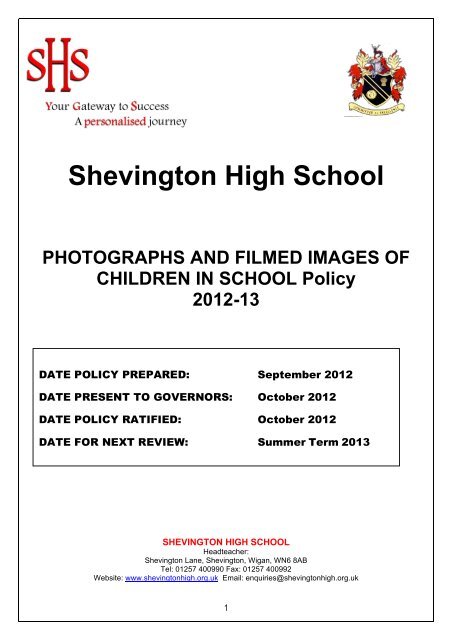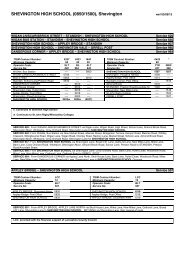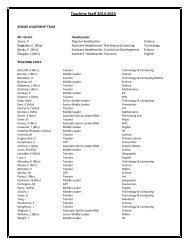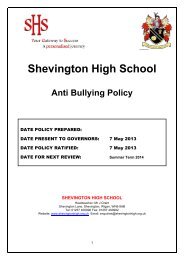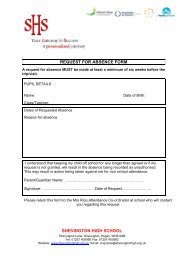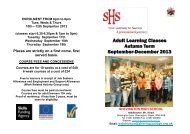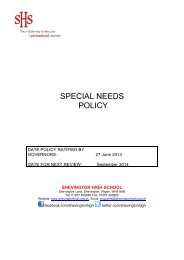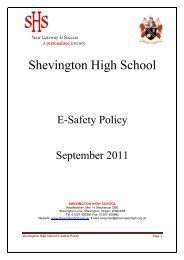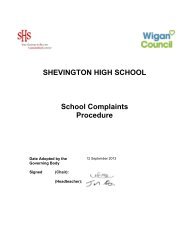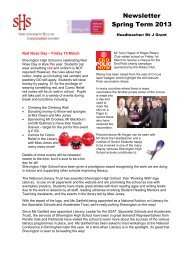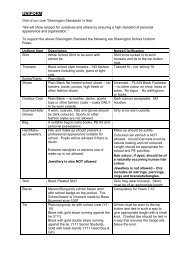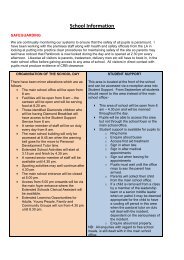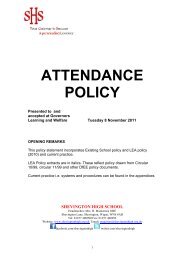Shevington High School PHOTOGRAPHS AND FILMED IMAGES ...
Shevington High School PHOTOGRAPHS AND FILMED IMAGES ...
Shevington High School PHOTOGRAPHS AND FILMED IMAGES ...
You also want an ePaper? Increase the reach of your titles
YUMPU automatically turns print PDFs into web optimized ePapers that Google loves.
<strong>Shevington</strong> <strong>High</strong> <strong>School</strong><br />
<strong>PHOTOGRAPHS</strong> <strong>AND</strong> <strong>FILMED</strong> <strong>IMAGES</strong> OF<br />
CHILDREN IN SCHOOL Policy<br />
2012-13<br />
DATE POLICY PREPARED: September 2012<br />
DATE PRESENT TO GOVERNORS: October 2012<br />
DATE POLICY RATIFIED: October 2012<br />
DATE FOR NEXT REVIEW: Summer Term 2013<br />
SHEVINGTON HIGH SCHOOL<br />
Headteacher:<br />
<strong>Shevington</strong> Lane, <strong>Shevington</strong>, Wigan, WN6 8AB<br />
Tel: 01257 400990 Fax: 01257 400992<br />
Website: www.shevingtonhigh.org.uk Email: enquiries@shevingtonhigh.org.uk<br />
1
<strong>Shevington</strong> Vision and Standards<br />
A family centered school at the heart of the community that nurtures potential,<br />
embraces technological innovation and fosters high aspirations to succeed in education<br />
work and life<br />
All different, all equal<br />
Taking Pride<br />
Succeeding Together<br />
Meeting the future<br />
<strong>Shevington</strong> Standards<br />
At <strong>Shevington</strong> <strong>High</strong> <strong>School</strong> in order to meet the school vision, Students and Adults are<br />
expected at all times to work hard to meet our 5 <strong>Shevington</strong> Standards which we have<br />
set in order to promote respect and dignity for all. Our attitudes, systems and rules are<br />
drawn from and support these standards. They are:-<br />
1. We will show respect for each other at all times<br />
2. We will show respect for <strong>School</strong> property and another person’s property at all<br />
times<br />
3. We will show respect for ourselves and others by ensuring that our actions do not<br />
put at risk the health and safety of ourselves or others<br />
4. We will show respect for ourselves and others by ensuring a high standard of<br />
personal appearance and organisation.<br />
5. We will show respect for ourselves and others by supporting a positive climate for<br />
learning<br />
2
Extracts taken from:<br />
• Wigan Council guidelines to inform a school policy on using photographs and filmed images of people in<br />
schools<br />
• Guidance for safer working practice for adults who work with children 2009<br />
1) Introduction<br />
This policy is about the use of images of people. The policy refers to both, still or moving images. The policy<br />
applies equally to film and digital cameras, webcams and camera phones.<br />
Working with pupils may involve the taking or recording of images. Any such work should take place with due regard<br />
to the law and the need to safeguard the privacy, dignity, safety and well being of pupils.<br />
Careful consideration should be given as to how activities involving the taking of images are organised and<br />
undertaken. Care should be taken to ensure that all parties understand the implications of the image being taken<br />
especially if it is to be used for any publicity purposes or published in the media, or on the Internet. There also<br />
needs to be an agreement as to whether the images will be destroyed or retained for further use, where these will<br />
be stored and who will have access to them. Adults need to remain sensitive to any children who appear<br />
uncomfortable, for whatever reason, and should recognise the potential for such activities to raise concerns or lead<br />
to misunderstandings. It is not appropriate for adults to take photographs of children for their personal use.<br />
In most cases, some form of permission is needed to take pictures of people. Care is needed with images where a<br />
person is clearly identifiable – either because the cameral has focussed on them, or because they are obviously the<br />
subject of the image. Where people’s faces are blurred or obscure, or they are one of a large group, it is not<br />
necessary to exercise the same caution.<br />
All school and council employees are subject to the law. Though enforcement action is rare, some councils have<br />
been successfully prosecuted for their misuse of photographs. Anyone can also sue if they feel that the use of their<br />
personal information, including photographs of them, has caused them damage or distress. No member of council<br />
staff should use images without being sure they have consent to do so – no attempt to avoid inconvenience should<br />
leave a school or its employees open to enforcement action or civil claims.<br />
2) Consent<br />
It is possible for parents or carers to sign general consent forms to cover photography in schools. The consent form<br />
is specific and covers all the activities, which the school expects children to be involved in. Whenever a photograph<br />
is used, the person using it must be confident that they have permission, either from a general consent form, which<br />
covers that use, or a specific consent obtained for the specific photograph.<br />
OPTIONS<br />
FREQUENCY OF CONSENT FORM USE<br />
• A consent form will be issued each year.<br />
FORMAT OF CONSENT FORM<br />
• A single consent form will be used, describing all uses of images that the school wishes to obtain consent for.<br />
3
METHOD OF CONSENT<br />
• After a given period, the school will assume that it has consent to use images of children unless they have<br />
received a signed form withholding consent.<br />
3) PRESS PHOTOGRAPHERS <strong>AND</strong> PUBLIC RELATIONS<br />
If the press are invited to attend a school event, we will agree in advance that they will identify themselves and<br />
respect the wishes if someone objects to having their picture taken (see appendix 1).<br />
Where the press are invited into a school, the school is responsible for ensuring that they have consent from<br />
parents for children to be photographed.<br />
4) RECORDING <strong>IMAGES</strong> OF CHILDREN (UNDER 16s)<br />
Any filming or photography involving any of our children will be handled with sensitivity. No photography will happen<br />
inside school without the consent of the Headteacher.<br />
4.1 CONSENT<br />
• Children have the same right to refuse photography as adults.<br />
• Children will only be photographed or filmed in appropriate clothing and settings.<br />
• In general, children of 12 years or older are considered to be old enough to make their own decision about<br />
whether they want to be photographed, but their parents will be consulted.<br />
4.2 INDIVIDUAL PICTURES<br />
Photographs of a clearly identifiable child will always be covered by permission from that child’s parents, or the<br />
child itself if it is aged 12 or over. This will be via the consent form, or individual permission if the consent form<br />
does not cover the circumstances. Verbal permission is enough for a small group.<br />
4.3 SMALL GROUPS <strong>AND</strong> INDIVIDUALS.<br />
When taking a picture of a small group or of an individual, consent will be sought – this can be verbal consent.<br />
4.4 PHOTOGRAPHING GENERAL SCENES<br />
Consent will not be sought to record images of large groups in public areas. Nevertheless, a photographer or<br />
camera crews on school premises will give those who do not want to be included a chance to move out of the<br />
shot if their face would be visible.<br />
4.5 THE USE OF <strong>IMAGES</strong> ON NEWSLETTERS, WEBSITES <strong>AND</strong> SCHOOL SOCIAL MEDIA<br />
OPTIONS<br />
• Consent forms will specify that images may be used on newsletters, websites and school social media, and<br />
parents will have the opportunity to opt out. (See Appendix 2)<br />
Images will never be used on newsletters, websites or school social media if the result might be some damage<br />
or distress to the child or their family.<br />
OPTIONS<br />
4
• The Christian name of a child may appear on a website or school social media picture caption if the picture<br />
is to illustrate a story about them or their achievements with specific parental permission.<br />
5) RE-USING <strong>AND</strong> SHARING <strong>IMAGES</strong><br />
Images will not be used for anything other than the original reason for taking the image without renewed consent<br />
from the subject(s). Consent will not be assumed. Contact details will be obtained from the subjects of a<br />
photograph wherever possible.<br />
Images will be kept securely and held for only as long as they are needed.<br />
6) COPYRIGHT<br />
If the school employs a photographer to take images on the school’s behalf, the school will wherever possible own<br />
the rights and retain copyright when the assignment is completed. The school will not agree to photographers from<br />
outside the school retaining copyright for images taken of school children, and negatives will be returned to the<br />
school or destroyed once the images have been developed and supplied. Staff will take all reasonable steps to<br />
ensure that images taken in schools are not subsequently used or misused in a way that would offend or upset the<br />
people in those images.<br />
7) <strong>IMAGES</strong> TAKEN BY TEACHERS <strong>AND</strong> OTHER STAFF<br />
Images taken by staff on behalf of the school should belong to the school. If the equipment and media belong to<br />
the staff member, they will understand that images taken in the course of schoolwork belong to the school.<br />
OPTIONS<br />
• Staff will not take pictures of children for their own purposes without the headteacher’s permission.<br />
8) INVITED/END OF YEAR PHOTOGRAPHERS<br />
Before allowing photographers into school, staff will ensure their suitability to take pictures of children. Anyone<br />
invited to a school to take photographs, for sale to parents will be subject to a criminal Records Bureau check.<br />
Photographers will also comply with the Data Protection Act and the school will verify that the photographer has<br />
provided a DP notification to the Information Commissioner.<br />
The school does not own the pictures themselves. Any contract or agreement will be between the photographer and<br />
parents who are buying the pictures.<br />
The photographer will provide an agreement explaining who owns copyright on the images and what will happen to<br />
the negatives, and making clear whether he/she wants to make any other use of the images. The school will be<br />
clear that they do not own copyright on the pictures and that the pictures are not part of the official educational<br />
record. The school is a venue for a transaction between parents and photographers.<br />
9) CAMERA DEVICES / PHONES<br />
,<br />
Mobile phone/device misuse<br />
Mobile phone misuse is not restricted to occurrences in school. It may involve misuse outside of school and can<br />
adversely affect other pupils and is taken very seriously.<br />
Examples of misuse include:<br />
5
• taking, transferring or storing inappropriate material<br />
• harassment or bullying by phone or text<br />
• uploading or downloading photographs or video footage taken in school.<br />
If mobile device misuse outside school is found to be affecting pupils in school, the parents of the pupil(s) involved<br />
will be contacted and sanctions (e.g. removal of permission to bring mobile phone to school; exclusion) are likely to<br />
be applied.)<br />
Where mobile devices are specifically mentioned in this policy they also cover smartphones and any equipment with<br />
audio and video recording functionality such as personal digital assistants, media recorders, digital cameras, and<br />
MP3/4 players.<br />
Other concerns include social networking or mobile blogging (the ability to update weblogs while on the move using<br />
mobile devices), with many young people posting content and images online of themselves and their friends. A key<br />
concern is the level of personal information young people are making available, particularly with regard to their<br />
whereabouts and daily routines.<br />
Result of mobile device misuse<br />
This policy on photographs and filmed images using mobile devices is clear and unequivocal. Breaches of the policy<br />
may lead to temporary confiscation of equipment, communication with parents and the imposition of other sanctions<br />
up to and including exclusion from school. In the most serious breaches, there may be a crime involved – an<br />
incident that is being filmed might be an assault or breach of the peace. In such cases, the matter would warrant<br />
being reported to the Police. The policy guidelines and associated information for parents and pupils constitute<br />
formal notification that appropriate action will be taken against those who are in breach.<br />
It is impracticable to ban all mobile phones from schools. It is also impracticable to distinguish where phones have<br />
or do not have a camera and/or video or audio recording function or access to the internet.<br />
Parents are asked to support this policy by ensuring their child does not bring a mobile phone to school except<br />
where this is genuinely necessary. This will reduce the temptation for the pupil to become involved in inappropriate<br />
use. It will also reduce the possibility of theft or loss of potentially expensive equipment and the potential for<br />
disruption of lessons.<br />
If pupils choose - despite the above strong advice to all parents - to bring mobile phones into school, they will do so<br />
under the following limitations which all schools will adhere to strictly, namely;<br />
· as the use of mobile phones during lessons is highly disruptive to the learning and teaching process, all<br />
phones must be switched off in lessons unless authorised by the classroom teacher. (it is not acceptable for<br />
phones merely to be put on silent or pager mode); this order includes corridors and all other areas of the<br />
school during teaching time<br />
· all phones must be kept out of sight during lessons<br />
· in line with current practice, no pupil may take a mobile phone into a room or other area where<br />
examinations are being held<br />
It follows that to photograph or video record staff or other pupils without their knowledge or permission will be<br />
regarded as serious misuse of a mobile phone (or any other audio or video recording equipment).<br />
Bullying by the use of text or multimedia messaging is unacceptable, as are any other instances of inappropriate<br />
messaging or posts to social networking or blogging sites.<br />
6
Pupil discipline procedures and sanctions for breaches of this policy will apply to using phones in schools contrary<br />
to the terms of this statement and, most seriously, to the covert recording of staff and pupils.<br />
Teaching and support staff are entitled to confiscate equipment where this policy guidelines are breached including<br />
where the equipment is on view during lessons. Staff will be required to judge when the circumstances merit such<br />
action. Particular attention will be given to enforcing these policy guidelines when pupils are in areas such as toilets<br />
and changing rooms and any misuse occurring will be considered a particularly serious breach of this policy..<br />
With respect to pupils entering PE/gym lessons in possession of mobile phones despite the strong advice not to<br />
bring them to school, it must be clear that staff will take no responsibility for the security of such items. With up to 30<br />
mobile phones in a single class many of similar appearance and branding, procedures to secure these at the start of<br />
a lesson and ensure the safe return to the correct owner at the end would be onerous for staff.<br />
Filming criminal activity of others, downloading/uploading or forwarding pornographic images might constitute illegal<br />
or criminal activity on the part of the mobile phone owner.<br />
Head Teachers have the right to view files stored in confiscated equipment and will seek the cooperation of parents<br />
in deleting any files which are clear breaches of this policy before the equipment is returned to the pupil. If it is<br />
considered that an illegal activity may have taken place, the Head Teacher will consult the appropriate Head of<br />
Service on what action to take.<br />
Confiscated equipment will normally be returned at the end of the school day. In certain cases (e.g. repeated<br />
misuse), at the discretion of the Head Teacher, parents may be requested to come to the school to collect the<br />
phone.<br />
Equipment confiscated in following guidelines of this policy will be sent to and stored securely by the school office<br />
and return arranged by a member of the office at the end of a day.<br />
Where a pupil persistently breaches the policy guidelines, the Head Teacher will consider imposing an outright<br />
short-term ban, following a clear warning, from bringing a mobile phone to school. In such circumstances, the pupil<br />
will not be permitted to bring any such equipment to the school at any time.<br />
Members of the school community who are subjected to - or who witness - any form of harassment by the misuse of<br />
mobile phones (and other audio or video recording equipment) should report the incident(s) to a member of the<br />
school's senior leadership team immediately.<br />
This policy will be subject to regular review and updating in order to ensure that the personal safety of <strong>Shevington</strong>'s<br />
children, young people and school staff is protected and that the learning environment is not disturbed by current or<br />
emerging mobile technologies.<br />
10) SCHOOL EVENTS, CONCERTS <strong>AND</strong> PLAYS<br />
Parents and relatives are legally entitled to photograph or film concerts and events. Consent is not a legal<br />
requirement, as long as images are used for private or home use. The school’s consent form will address the issue<br />
of photographs at school events.<br />
7
APPENDIX 1<br />
NOTES FOR PRESS PHOTOGRAPHERS ATTENDING SCHOOL EVENTS<br />
The Data Protection Act 1988 gives people the right to be told who is using their personal data and what will happen to<br />
it. It also gives them the right to refuse to allow some information about themselves to be used without their permission.<br />
Photographs, especially close-up photographs that clearly identify an individual person, are considered to be personal<br />
data.<br />
Members of the press are covered by an exemption called the “Special Purposes Exemption,” which allows them to use<br />
information without permission in some circumstances. However, this exemption only applies where it would be<br />
impossible and unreasonable to follow the normal procedures for gathering and using personal information.<br />
Press photographers do not need to ask for permission when taking pictures of large crowds, or of participants<br />
in a public ceremony like a prize-giving event, unveiling or speech.<br />
<strong>Shevington</strong> <strong>High</strong> <strong>School</strong> does not wish to restrict or prevent press access to this event. However, we do expect press<br />
photographers to abide by these rules, to ensure that photographs are used properly. If images of people are used<br />
unfairly, or in ways, which cause offence or upset, it will damage the reputation of both the school and the news<br />
organisation concerned.<br />
RULES<br />
• Photographers should wear an identifying badge or sticker so that people, especially parents, know that<br />
they are taking pictures for the press.<br />
• When taking close-up photographs of children, you must check with their parents before doing so.<br />
• When taking photographs of small, identifiable groups, you should explain what you are doing and give<br />
people who do not wish to be photographed the opportunity to move out of shot.<br />
• If a person objects to a photograph that has already been taken, the photographer should respect their<br />
wishes and not use it.<br />
These rules amount to little more than ordinary courtesy. The school wishes to ensure that press<br />
photographers can attend school events without causing offence or upset to children or their parents.<br />
8
APPENDIX 2<br />
Dear Parents<br />
<strong>PHOTOGRAPHS</strong> <strong>AND</strong> <strong>FILMED</strong> <strong>IMAGES</strong> OF CHILDREN IN SCHOOL<br />
Could you please read this letter carefully as it shows the basic details of the school’s policy, which was adopted from<br />
the Wigan LA policy on using photographs and filmed images of children in school.<br />
• A single consent form (which is this letter) will be used, each year describing all uses of images that the school<br />
wishes to obtain consent for.<br />
• After 2 weeks from the date of this letter, the school will assume that it has consent to use images of children<br />
unless they have received a signed form withholding consent at the end of this letter.<br />
• Images will be stored on the <strong>School</strong>’s Information Management System.<br />
• If the press are invited to attend a school event, we will agree in advance that they will identify themselves and<br />
respect the wishes if someone objects to having their picture taken.<br />
• Any filming or photography involving any of our children will be handled with sensitivity. No photography will<br />
happen inside school without the consent of the Headteacher.<br />
• Images may be used on newsletters, websites or school social media unless the parents have withheld consent<br />
by the completion of the form at the end of this letter.<br />
• Images will not be used for anything other than the original reason for taking the image without renewed<br />
consent from parents.<br />
• If the school employs a photographer to take images on the school’s behalf, the school will wherever possible<br />
own the rights and retain copyright when the assignment is completed. The school will not agree to<br />
photographers from outside the school retaining copyright for images taken of school children, and negatives<br />
will be returned to the school or destroyed once the images have been developed and supplied. Staff will take<br />
all reasonable steps to ensure that images taken in schools are not subsequently used or misused in a way that<br />
would offend or upset the people in those images.<br />
• Images taken by staff on behalf of the school should belong to the school. If the equipment and media belong<br />
to the staff member, they will understand that images taken in the course of schoolwork belong to the school.<br />
• Before allowing photographers into school, staff will ensure their suitability to take pictures of children. Anyone<br />
invited to a school to take photographs, for sale to parents will be subject to a criminal Records Bureau check.<br />
The school does not own the pictures themselves. Any contract or agreement will be between the photographer<br />
and parents who are buying the pictures.<br />
• The use of cameras or image recording devices of any kind is prohibited in the toilets or changing rooms in any<br />
part of the school building or facility.<br />
• Parents and relatives are legally entitled to photograph or film concerts and events. Consent is not a legal<br />
requirement, as long as images are used for private of home use. If the slip overleaf is returned stating that<br />
parents do not wish their child to be photographed then the child will not be able to take part in any school<br />
production as school allows photographs and films of concerts and events to take place.<br />
PLEASE RETURN THIS SLIP TO THE SCHOOL OFFICE NO LATER THAN 2 WEEKS FROM THE DATE OF THIS<br />
LETTER: ONLY IF YOU DO NOT WANT YOUR CHILD TO BE <strong>FILMED</strong> OR PHOTOGRAPHED.<br />
Pupil’s Name: …………………………………….<br />
Form: ……………………………<br />
I DO NOT GIVE PERMISSION for my child to be filmed or photographed in any way whatsoever.<br />
Signed: ………………………………….. (Parent/Guardian) Date: …………………………….<br />
9
Comments (not part of the policy)<br />
There is no law against parents, relatives and friends taking pictures at a school event. There are almost no known cases of<br />
images taken in such circumstances being misused.<br />
<strong>School</strong>s are private property and so a Headteacher or Governing Body is entitled to ban photography on school premises.<br />
However, this will be an unpopular and potentially unfair decision, as it prevents parents from recording their children’s<br />
achievements, in order to protect children from an unspecified risk that in any case is largely the product of media speculation and<br />
hype.<br />
The recommended option is to allow some photographs or videos to be taken. Each school is responsible for finding the best way<br />
of achieving this. A total ban should only be considered where the majority of parents are in favour of such a ban.<br />
OPTIONS<br />
THE BASIC POSITION<br />
a) Anyone who attends a school event will be allowed to take photographs.<br />
b) Family members who attend school events are allowed to take photographs, but they should respect the<br />
Headteacher’s judgement if for any reason they are asked to cease taking photographs.<br />
c) Anyone who wishes to use a camera at a school event must obtain permission from the Headteacher.<br />
d) The use of cameras at a school event is forbidden.<br />
FLEXIBILITY<br />
a) The school always allows photography at school events.<br />
b) The school never allows photography at school events.<br />
c) The school will consult parents before any school event on the issue of photography in school.<br />
CONSENT<br />
a) It is a condition of a child’s participation in a school event that other people will be allowed to take photographs.<br />
b) Parents who do not wish their child to be photographed should inform the Headteacher. Arrangements will be made for<br />
photographs to be taken at specific points, so that these children can be absent.<br />
c) Photographs will only be allowed where all parents specifically consent.<br />
11) CCTV<br />
<strong>School</strong>s will always use signs to indicate that CCTV cameras are in place. CCTV cameras will never be used in toilets, or<br />
changing facilities.<br />
12) FURTHER INFORMATION<br />
• If the school employs a photographer to take images on the school’s behalf, the school will wherever possible<br />
own the rights and retain copyright when the assignment is completed. The school will not agree to<br />
photographers from outside the school retaining copyright for images taken of school children, and negatives<br />
will be returned to the school or destroyed once the images have been developed and supplied. Staff will take<br />
all reasonable steps to ensure that images taken in schools are not subsequently used or misused in a way that<br />
would offend or upset the people in those images.<br />
• Images taken by staff on behalf of the school should belong to the school. If the equipment and media belong<br />
to the staff member, they will understand that images taken in the course of schoolwork belong to the school.<br />
• Before allowing photographers into school, staff will ensure their suitability to take pictures of children. Anyone<br />
invited to a school to take photographs, for sale to parents will be subject to a criminal Records Bureau check.<br />
The school does not own the pictures themselves. Any contract or agreement will be between the photographer<br />
and parents who are buying the pictures.<br />
• Cameras on camera devices must not be used in school by anyone eg: pupils, staff, governors,<br />
contractors, parents, visitors etc. unless it is a public event then they may be used by parents, pupils<br />
and visitors (see appendix)<br />
10
• Mobile phones are allowed in school but must always be switched off unless authorised by the<br />
classroom teacher.<br />
• The use of cameras or image recording devices of any kind is prohibited in the toilets or changing rooms in any<br />
part of the school building or facility.<br />
• Parents and relatives are legally entitled to photograph or film concerts and events. Consent is not a legal<br />
requirement, as long as images are used for private or home use. If the reply slip at the end of the letter is<br />
returned stating that parents do not wish their child to be photographed then that child will not be able to take<br />
part in any school production as school allows photographs and films of concerts and events to take place.<br />
11


